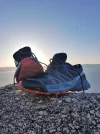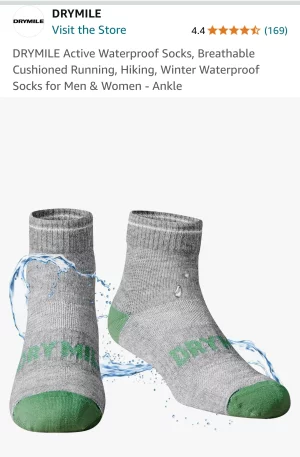I wear waterproof boots, and have done so for most of my pilgrimage walks. I am not convinced by the arguments of those that say they are too hot in summer, etc, etc. Most appear to be repeats of myths and devoid of personal experience. Your feet will get hot, just like the rest of your body, which can be reduced as much by wearing appropriate, lighter weight, socks as anything else. When they are hot, they will sweat, just like the rest of your body, and you will want your socks to absorb any moisture that hasn't been transpired through the waterproof membrane, so your feet will get damp as well.
If you do want waterproof boots to work effectively in the rain, you need to be wearing rain pants or long gaiters under a poncho. If not, the place that will let most water in is the same large hole at the top of the boot through which you put your foot, and there is no waterproofing in the world that will stop the rain from running down your trousers (or bare legs) that will protect you then.
If you think of your protection from getting wet from rain, puddles, etc as a system that includes all the protection elements, hat, rain jacket and pants or poncho and gaiters, and footwear, that might help with this decision.
Remember that in Spain, in summer, you are just as likely to get soaked from the inside of your jacket or poncho as from the outside. I prefer to keep my warm sweat on the inside and the cold rain on the outside, but you might choose to just protect your torso, and not your lower body. Just accept that your feet will get wet, and will dry eventually. In that case, don't even bother with using waterproof footwear. Keep watch to ensure you don't blister, and seek medical advice if any skin masceration does not respond to simple airing during or at the end of the day.




















